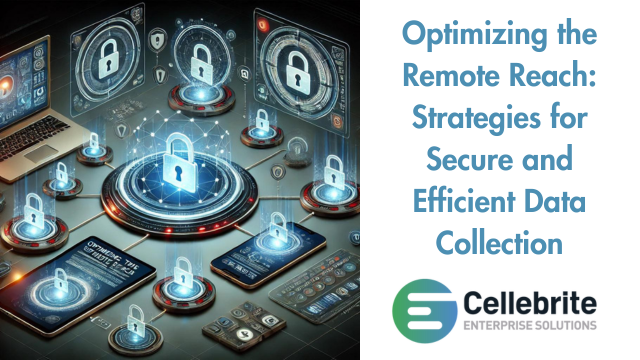 Image: Kaylee Walstad, EDRM with AI – Hat Tip to Ralph Losey’s Visual Muse.
Image: Kaylee Walstad, EDRM with AI – Hat Tip to Ralph Losey’s Visual Muse.
The digital revolution has irrevocably transformed the way we conduct business, and investigations are no exception. The surge in remote work models has rendered traditional on-site data collection methods increasingly insufficient. This necessitates a paradigm shift towards remote data collection, empowering investigators to securely gather evidence at scale from geographically dispersed devices.
The surge in remote work models has rendered traditional on-site data collection methods increasingly insufficient. This necessitates a paradigm shift towards remote data collection, empowering investigators to securely gather evidence at scale from geographically dispersed devices.
Ashley Hernandez, Cellebrite Enterprise Solutions.
Why Remote Data Collection is Critical
The importance of remote data collection transcends convenience. It empowers organizations to effectively address a multitude of challenges:
- The Ascendancy of eDiscovery: The ever-expanding volume of Electronically Stored Information (ESI)—emails, documents, chat logs—particularly from collaboration platforms and virtual meetings, presents a significant challenge for legal professionals. Manually sifting through this data is a Sisyphean task. Remote data collection streamlines the eDiscovery process, enabling targeted collection and efficient analysis.
- The Prevalence of Remote Work: With the remote work model still prevalent across industries, traditional on-site data collection becomes logistically impractical. Remote data collection bridges this gap, allowing investigators to securely acquire evidence from employee devices regardless of location.
- The Evolving Threat Landscape: The digital realm is rife with cyberattacks, data breaches and internal misconduct, often perpetrated remotely. Organizations require efficient means to collect data and investigate these incidents, irrespective of the perpetrator’s location. Remote data collection allows for a swift and decisive response.
Challenges and Considerations: Navigating the Remote Frontier
While remote data collection offers undeniable advantages, it also presents unique challenges that require careful consideration:
- Security and Chain of Custody: Maintaining the integrity of collected data is paramount. Robust security protocols are essential to safeguard sensitive information throughout the collection process. Additionally, ensuring a verifiable chain of custody—a documented record of the data’s handling—is crucial for legal defensibility.
- Employee Privacy: Striking a balance between collecting necessary evidence and respecting employee privacy is a delicate task. Data privacy regulations add another layer of complexity. Organizations must navigate this landscape by implementing clear policies and procedures that adhere to legal requirements while minimizing disruption to employee privacy.
- Data Volume and Heterogeneity: Remote data collection can yield a vast amount of data in diverse formats, from emails and documents to social media posts and mobile device logs. This sheer volume and variety can be overwhelming. Investigators require robust tools for data management, filtering and analysis to gain meaningful insights from the collected information.
Optimizing the Remote Data Collection Process
Organizations can overcome these challenges and tap into the full potential of remote data collection by implementing a comprehensive strategy:
- Develop a Comprehensive Remote Data Collection Policy: A clear and concise policy outlining the procedures for remote data collection is essential. This policy should address data security protocols, chain of custody documentation and employee privacy considerations. It should also define the types of data that can be collected and the circumstances under which remote data collection is authorized.
- Invest in Investigator Training and Education: Equipping investigators with the knowledge and skills necessary for secure and legally compliant remote data collection is crucial. Training should cover topics such as data privacy regulations, digital forensics techniques, best practices for remote device access and the legal implications of remote data collection.
- Embrace Technological Solutions: Leverage cutting-edge technology solutions specifically designed for secure and efficient remote data collection. These solutions might include tools for secure remote device access, targeted data collection based on pre-defined criteria and secure cloud storage with a comprehensive audit trail.
The Future of Remote Data Collection
By acknowledging the challenges and implementing these strategies, organizations can optimize their investigative workflows and leverage the power of remote data collection. This translates to faster investigations, reduced costs associated with travel and logistics and ultimately, stronger investigative outcomes. As technology continues to evolve, the future of remote data collection is likely to witness advancements in areas like artificial intelligence-powered data analysis and real-time data collection capabilities, further streamlining the investigative process.
In conclusion, remote data collection is not just a trend but a necessity in today’s digital landscape. By embracing this approach and implementing a comprehensive strategy, organizations can ensure they are well-equipped to conduct efficient, secure and legally defensible investigations in an increasingly remote world.